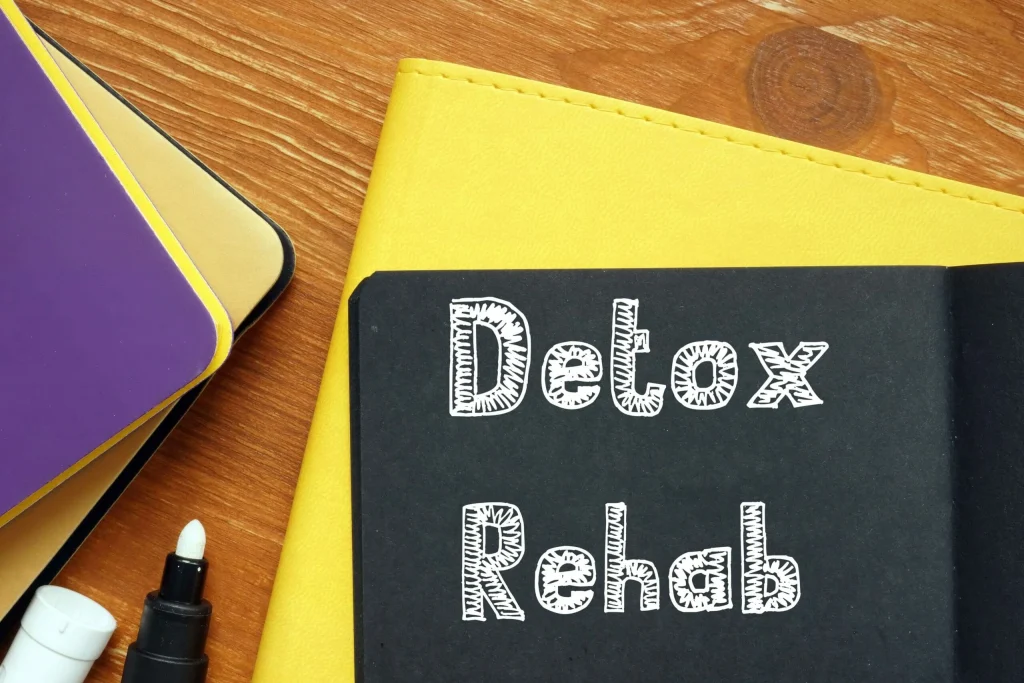Navigating the Path to Recovery: Detox vs. Rehab
In the realm of substance abuse recovery, individuals are presented with a crucial decision: detoxification (detox) or rehabilitation (rehab)? While both detox and rehab serve as pivotal steps on the journey to sobriety, they cater to distinct aspects of recovery. This essay delves into the differences between detox and rehab, their individual roles, and the factors to consider when making this critical choice.

Understanding Detox: Clearing the System
Detoxification, commonly referred to as detox, is the initial phase of substance abuse treatment. Its primary objective is to rid the body of the toxic substances accumulated due to drug or alcohol use. Detox is carried out under medical supervision, ensuring the safety and comfort of the individual during the withdrawal process. This phase addresses the physical aspect of addiction by managing withdrawal symptoms and preventing potentially life-threatening complications.
Key Components of Rehab: Addressing the Underlying Factors
Rehabilitation, or rehab, extends beyond the physical detoxification process. It encompasses a comprehensive approach to addiction recovery, focusing on the psychological, emotional, and behavioral dimensions of addiction. Rehab typically involves individual and group therapy sessions, counseling, education about addiction, and skill-building exercises. The aim is to identify the underlying causes of addiction, develop coping strategies, and equip individuals with the tools to lead a substance-free life.
The Role of Detox: Setting the Stage for Recovery
Detox serves as the necessary foundation upon which the rest of the recovery journey is built. Without a clear system free from the influence of substances, effective therapy and psychological healing cannot take place. Detox provides a safe environment where medical professionals monitor withdrawal symptoms, administer medications if needed, and ensure the individual’s physical well-being. It is a crucial step to enable individuals to engage fully in the subsequent rehabilitation process.
The Power of Rehab: Healing the Whole Person
Rehabilitation is where the true transformation occurs. Addiction often stems from complex psychological and emotional factors, such as trauma, underlying mental health conditions, or dysfunctional coping mechanisms. Rehab delves into these deeper layers, offering individuals a chance to confront and address the root causes of their addiction. Through therapy, counseling, and skill-building exercises, rehab empowers individuals to develop healthy coping mechanisms, build resilience, and reshape their lives.
Factors to Consider: Making the Right Choice
When choosing between detox and rehab, several factors come into play. The severity of addiction, the presence of co-occurring mental health disorders, and the individual’s support system all play significant roles. Mild cases of addiction with minimal withdrawal symptoms might find success with detox alone, while those grappling with long-term or severe addiction benefit greatly from a comprehensive rehab program. Moreover, addressing underlying mental health issues might necessitate a longer stay in rehab to ensure holistic healing.
Holistic Healing: The Ideal Synergy
While detox and rehab serve different purposes, they are inherently interconnected in the journey to recovery. Detox paves the way for effective rehab by creating a clean slate, while rehab provides the necessary tools and strategies for lasting sobriety. For a comprehensive and sustainable recovery, individuals are encouraged to consider both detox and rehab as integral parts of their healing journey. The synergy between the two approaches maximizes the chances of successful recovery, offering individuals the opportunity to reclaim their lives and rebuild their futures.
Choosing the Path to Recovery: Detox vs. Rehab
The road to recovery from substance abuse is a profound journey that demands careful consideration of available options. Among the pivotal decisions individuals face is whether to pursue detoxification (detox) or rehabilitation (rehab). Both detox and rehab play critical roles in breaking the chains of addiction, yet they serve distinct purposes on the path to recovery. This essay explores the nuances of detox and rehab, shedding light on their differences, benefits, and factors to weigh when making this significant choice.
Detox: A Crucial First Step
Detox is the initial stage of addiction treatment, focusing on the physiological aspect of substance dependence. It involves a systematic process of allowing the body to rid itself of the toxic substances it has become dependent upon. Medically supervised detox programs offer a safe environment for individuals to manage withdrawal symptoms, which can range from uncomfortable to severe. The goal of detox is to achieve physical stabilization and cleanse the body, preparing it for the subsequent stages of recovery.
Rehab: Healing the Mind and Soul
Rehabilitation, or rehab, represents a comprehensive approach to addiction recovery that addresses the psychological, emotional, and behavioral dimensions of substance abuse. While detox primarily targets the body, rehab delves into the complex interplay between addiction and mental health. Through individual and group therapy sessions, counseling, and behavioral interventions, rehab seeks to uncover the root causes of addiction, develop coping skills, and provide tools for sustained sobriety.
Detox vs. Rehab: Complementary Rather Than Contradictory
Detox and rehab are not opposing choices but rather complementary stages on the journey to recovery. Detox lays the groundwork by eliminating the physical dependence on substances, allowing individuals to engage fully in the therapeutic processes offered in rehab. While detox offers a vital first step, rehab delves deeper, addressing the emotional triggers, psychological patterns, and behavioral cycles that perpetuate addiction. Therefore, the decision between detox and rehab should not be viewed as an either-or proposition but rather as a holistic progression toward lasting recovery.
Individualized Approach: Tailoring Treatment
The choice between detox and rehab is not one-size-fits-all; it must be tailored to the individual’s unique circumstances. Factors such as the type of substance abused, the duration of addiction, the presence of co-occurring mental health disorders, and the level of support from family and friends all influence this decision. Individuals with milder addiction and minimal withdrawal symptoms may find success with detox followed by outpatient therapy. In contrast, those battling chronic addiction or complex underlying issues may benefit more from the comprehensive care offered in a rehab program.
The Importance of Aftercare: Sustaining Progress
After completing detox or rehab, the journey to recovery continues through aftercare. Aftercare involves ongoing support and strategies to prevent relapse. It may include outpatient counseling, support groups, and relapse prevention planning. Transitioning from the structured environment of rehab to everyday life can be challenging, and aftercare serves as a vital bridge to help individuals navigate potential triggers and maintain their progress.
Embracing the Continuum of Care
The choice between detox and rehab is not a binary decision but rather a thoughtful consideration of the individual’s needs, circumstances, and goals. Both detox and rehab are integral components of the continuum of care, each contributing to the overarching goal of sustained recovery. While detox initiates physical stabilization, rehab provides the tools for comprehensive healing. In making this choice, individuals should seek guidance from medical professionals and addiction specialists to ensure a tailored treatment plan that sets them on a path toward lasting recovery.

Detox vs. Rehab: Navigating the Path to Recovery
In the realm of addiction treatment, the terms “detox” and “rehab” are often used interchangeably, yet they represent distinct phases in the journey toward recovery. The decision to undergo detoxification or rehabilitation is a pivotal one, requiring careful consideration of individual needs and circumstances. This essay delves into the differences between detox and rehab, exploring their roles, benefits, and the symbiotic relationship they share in the quest for lasting recovery.
Detoxification: The First Step Toward Healing
Detoxification, commonly referred to as detox, is the initial stage of addiction treatment. It primarily focuses on the physical aspect of addiction by eliminating the toxic substances from the body. During this process, individuals experience withdrawal symptoms as their bodies adjust to the absence of the addictive substance. Medical supervision is often crucial during detox to ensure safety and manage potentially severe withdrawal symptoms.
Detox addresses the immediate physical dependence on drugs or alcohol, paving the way for subsequent stages of treatment. While detox is vital for breaking the physiological bond with the substance, it does not address the underlying psychological, emotional, and behavioral aspects of addiction. As a standalone treatment, detox has limitations in fostering long-term recovery.
Rehabilitation: Unraveling the Complex Web of Addiction
Rehabilitation, or rehab, marks the comprehensive phase of addiction treatment that goes beyond detoxification. Rehab aims to address the multifaceted nature of addiction by targeting the psychological, emotional, and behavioral components that contribute to substance abuse. This holistic approach is often achieved through therapeutic interventions, counseling, group therapy, and educational sessions.
Rehabilitation offers a safe and structured environment for individuals to gain insight into the root causes of their addiction. It equips them with coping mechanisms, life skills, and relapse prevention strategies that are essential for maintaining sobriety after treatment. The duration of rehab programs can vary, with options ranging from short-term stays to extended residential programs, depending on the severity of addiction and individual needs.
The Symbiosis of Detox and Rehab: A Comprehensive Approach
Detox and rehab are not opposing choices; rather, they complement and reinforce each other in the journey to recovery. Detox sets the foundation by addressing the immediate physical dependency, making individuals more receptive to the psychological interventions offered in rehab. Attempting rehab without prior detox can be challenging, as withdrawal symptoms may impede the engagement in therapeutic activities.
The symbiotic relationship between detox and rehab is akin to building a house: detox lays the groundwork by clearing the land and preparing the foundation, while rehab constructs the sturdy structure and designs the interior to make it a livable, functional space. Both phases are integral to achieving lasting recovery, with detox enabling rehab to take root and rehab providing the tools necessary for maintaining sobriety post-treatment.
Personalized Paths to Recovery: Navigating Detox and Rehab
The choice between detox and rehab depends on individual circumstances, severity of addiction, and personal preferences. For individuals with a milder addiction and a strong support system, outpatient detox followed by outpatient rehab might be suitable. Those with more entrenched addiction may require inpatient detox followed by residential or intensive outpatient rehab.
Ultimately, the decision should be guided by a comprehensive assessment conducted by medical professionals and addiction specialists. An individualized treatment plan that considers the physical, psychological, and emotional aspects of addiction will yield the best outcomes.
Paving the Road to Lasting Recovery
The journey from addiction to recovery is a winding road fraught with challenges and victories. Detox and rehab are two essential landmarks on this journey, each playing a distinct yet interdependent role. Detox clears the path by addressing physical dependency, while rehab builds the emotional and psychological framework for lasting recovery.
Understanding the differences between detox and rehab empowers individuals and their loved ones to make informed decisions about treatment options. While detox marks the initiation of recovery, rehab encompasses the transformative process that reshapes behaviors, beliefs, and perspectives. The combination of these two phases creates a solid foundation for individuals to reclaim their lives and embark on a journey toward a healthier, substance-free future.

Detox vs. Rehab: Navigating the Terrain of Addiction Recovery
The world of addiction recovery is marked by pivotal choices, and one of the earliest decisions individuals face is whether to undergo detoxification or engage in rehabilitation. Detox and rehab are not just treatment stages; they are distinct pathways on the journey toward a substance-free life. In this essay, we will explore the differences between detox and rehab, their objectives, and how they contribute to a comprehensive approach to overcoming addiction.
Detoxification: Clearing the Physical Hurdle
Detoxification, or detox, is the initial phase of addiction treatment. It primarily addresses the physical dependence on substances by purging the body of toxins accumulated through substance abuse. The process often involves medical supervision to manage withdrawal symptoms, which can range from mild discomfort to severe complications.
Detox is an essential step, especially for individuals with severe physical dependency. It provides a critical foundation for rehabilitation by breaking the physiological bond with the substance. However, detox alone does not tackle the psychological and behavioral aspects of addiction. It is a preparatory step that sets the stage for the subsequent stages of treatment.
Rehabilitation: Healing the Mind and Spirit
Rehabilitation, or rehab, goes beyond the physical realm to address the underlying causes of addiction. It encompasses a range of therapies and interventions aimed at reshaping behavior, thoughts, and emotions associated with substance abuse. Rehab is a comprehensive approach that takes into account the complex interplay of physical, psychological, and social factors contributing to addiction.
Rehab provides individuals with the tools to cope with triggers, manage cravings, and develop healthier coping mechanisms. Therapies such as cognitive-behavioral therapy, group therapy, and holistic approaches like art therapy or mindfulness are commonly employed. Rehab programs are designed to provide individuals with the skills and insights needed to maintain sobriety and navigate life’s challenges without resorting to substances.
Two Sides of the Same Coin: Integration for Success
Detox and rehab are not opposing choices; they are interconnected steps in the journey of recovery. Detox is a prerequisite for successful engagement in rehab. Attempting rehabilitation without prior detox can hinder the therapeutic process, as the physical withdrawal symptoms may overshadow the psychological work required in rehab.
The integration of detox and rehab creates a comprehensive approach to addiction treatment. Detox clears the path, allowing individuals to fully engage in the introspective and transformative work of rehab. The synergy between these stages enhances the likelihood of achieving long-term recovery.
Navigating the Decision: Factors to Consider
The decision between detox and rehab is influenced by several factors, including the severity of addiction, the individual’s physical health, the presence of co-occurring mental health conditions, and the availability of a support system. Individuals with mild addiction and strong support networks might opt for outpatient detox and rehab. Those with severe addiction and complex needs might benefit from residential detox followed by inpatient rehab.
Consulting with addiction professionals is crucial in making an informed decision. An individualized treatment plan tailored to the individual’s needs ensures the best chance of success.
Conclusion: A Holistic Journey of Healing
The journey from addiction to recovery is a profound transformation that requires a multifaceted approach. Detox and rehab are integral components of this journey, each playing a unique role. Detox clears the path of physical dependence, allowing individuals to engage fully in the therapeutic process of rehab. It’s important to recognize that detox and rehab are not competing options; rather, they are complementary phases that work in harmony to pave the way for lasting recovery.
Navigating the terrain of detox and rehab requires thoughtful consideration, professional guidance, and a commitment to change. By understanding the distinctions between these stages and their interdependent nature, individuals can embark on a holistic journey of healing that addresses the physical, psychological, and emotional aspects of addiction. Through the integration of detox and rehab, individuals can cultivate a foundation for lifelong sobriety and well-being.
